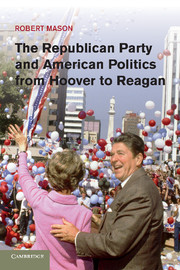Book contents
- Frontmatter
- Contents
- Acknowledgments
- Introduction
- 1 “From Old Home Melodies to Jazz Music”: 1928–1933
- 2 “As Maine Goes, So Goes Vermont”: 1933–1939
- 3 “The Simple Barefoot Wall Street Lawyer”: 1939–1945
- 4 “Liberty versus Socialism”: 1945–1953
- 5 “Modern Republicanism”: 1953–1961
- 6 “A Choice, Not an Echo”: 1960–1968
- 7 “There’s a Realignment Going On”: 1968–1976
- 8 “You Are Witnessing the Great Realignment”: 1977–1989
- Conclusion
- Archival Sources
- Index
- References
5 - “Modern Republicanism”: 1953–1961
Published online by Cambridge University Press: 05 December 2011
- Frontmatter
- Contents
- Acknowledgments
- Introduction
- 1 “From Old Home Melodies to Jazz Music”: 1928–1933
- 2 “As Maine Goes, So Goes Vermont”: 1933–1939
- 3 “The Simple Barefoot Wall Street Lawyer”: 1939–1945
- 4 “Liberty versus Socialism”: 1945–1953
- 5 “Modern Republicanism”: 1953–1961
- 6 “A Choice, Not an Echo”: 1960–1968
- 7 “There’s a Realignment Going On”: 1968–1976
- 8 “You Are Witnessing the Great Realignment”: 1977–1989
- Conclusion
- Archival Sources
- Index
- References
Summary
Dwight Eisenhower’s popularity and 1952’s victories encouraged high hopes for the Republican future. “There is every reason to suppose,” wrote journalist Richard Rovere in June 1953, “that with good management and just a small amount of luck [the Republicans] can build as formidable a series of political alliances as the Democrats built back in the thirties.” Eisenhower’s remarkable political appeal was especially important in fostering such hopes; he enjoyed national popularity of a breadth and depth rarely paralleled in American history. A crowd’s enthusiasm for him at a 1956 appearance caused one foreign journalist to remark, “I haven’t seen anything like this since Hitler.” At the White House he lost little of his popularity gained as a war hero; studies suggested that positive personal evaluations of him were even more extensive among Americans in 1956 than 1952 – enough to suggest to poll analysts that his reelection success relied more heavily on his strength as a political personality than on his presidential achievements.
The Republican Party failed to realize the hopes that Rovere outlined, however. Instead, the 1950s proved to be a decade of declining fortunes. In 1954, the party lost its narrow majorities in Congress. In 1956, despite Eisenhower’s landslide reelection to the presidency, Republicans failed to regain any ground on Capitol Hill. The results indicated, according to one reporter, “both the increasing grass-roots popularity of President Eisenhower and the increasing grass-roots unpopularity of the Republican party.” The results of the 1958 midterms then provided unambiguous evidence of the party’s weakness, as GOP representation sank to 34 seats in the Senate and 154 seats in the House. This was a midterm setback of unusually large proportions, which illustrated the enduring – growing, even – strength of the Democratic Party. The Eisenhower years ended on a barely more encouraging note; in 1960 Richard M. Nixon lost to John F. Kennedy, if narrowly, in the race for the presidency, and congressional Republicans won back only some of the seats lost two years before. Polls suggested that in 1960 no more than three in ten Americans identified themselves as Republicans. One reflection of Republican weakness then was the presidential candidates’ use of their party attachment during the campaign; Nixon downplayed his party attachment while Kennedy stressed his – a clear indicator of the labels’ contrasting value. The Republican Party in the 1950s unquestionably remained America’s minority.
- Type
- Chapter
- Information
- The Republican Party and American Politics from Hoover to Reagan , pp. 148 - 181Publisher: Cambridge University PressPrint publication year: 2011



